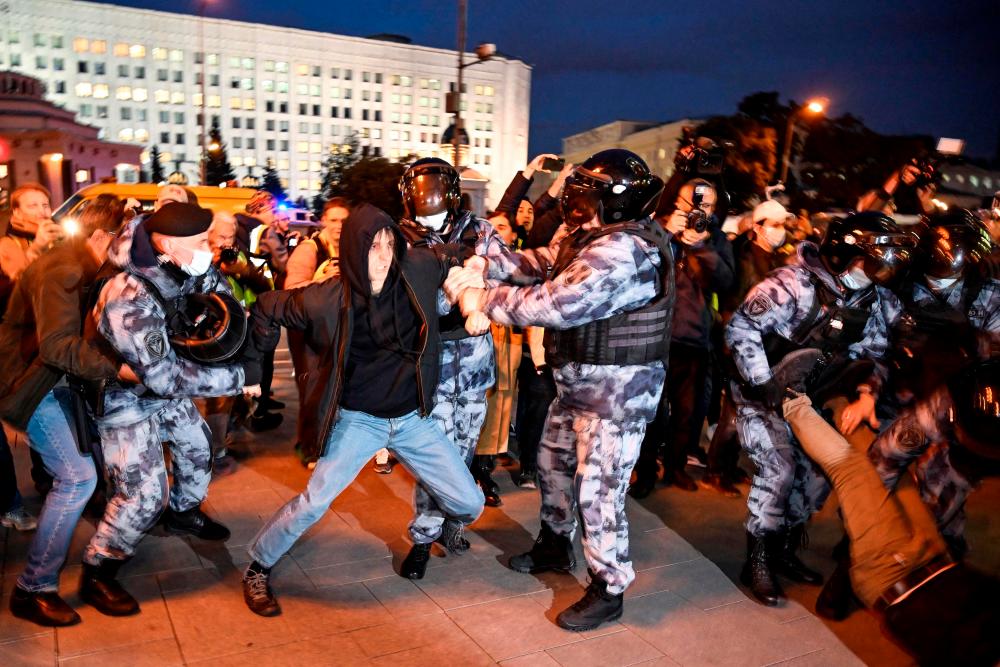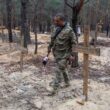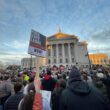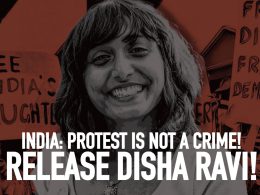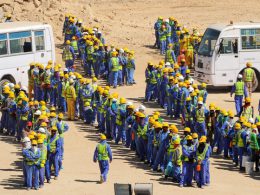By Walter Chambers, Socialist Alternative
Once again, President Putin has shocked the world with his TV broadcast to the Russian population in which he announced the “partial mobilisation” of troops to send to Ukraine, in what is still officially not called a “war”.
The essence of his speech claimed the “special military operation” was to liberate Donbas from the “Neo-nazi regime” and to “defend the sovereignty and territorial integrity of Russia”. He went on to say that Kyiv was positive about negotiations, but the western powers were determined to weaken, break-up and destroy Russia. He spoke of the thousand-kilometer front-line on which Russian forces had to fight “the whole military machine of the collective West” and of high-powered NATO representatives considering “allowing the use of weapons of mass destruction — nuclear weapons against Russia”. He warned that they should understand that Russia too has such weapons, and will use them if Russia’s territorial integrity is challenged.
New protests
Many Russians spent the day in shock and panic following this. Within minutes all seats on planes and buses out of Russia were sold, often at ten times normal prices. Due to sanctions, there are international flights to only a handful of countries. Queues of cars tens of kilometers long formed on the Finnish, Georgian, and even Mongolian borders. Google searches on how to break arms and legs peaked.
Having been knocked back by poor leadership and massive repression after the start of the war, yesterday saw new anti-war protests across Russia. Not on the scale of those in early March, but nevertheless significant. They are of a different character too — half of those who participated in the first ones were female, now that proportion has increased as mothers, sisters, and grandmothers worry about their menfolk.
Many troops from the notoriously authoritarian Chechnya have already been fighting in Ukraine, but have not been particularly effective — the Ukrainians call them “tik-tok troops” more interested in filming action. They have reportedly suffered heavy losses.
On Wednesday evening a group of women in Grozny, the Chechen capital, announced a protest against new mobilisation — they were quickly arrested. The authorities threatened to send all their male relatives to the front. Within hours a campaign “men against mobilisation” called for a demonstration after Friday prayers. Warlord dictator Ramzan Kadyrev was forced to cancel further mobilisation claiming Chechnya has already “over-fulfilled its plan”.
Elsewhere in the Russian Caucasus, men in Dagestan facing the threat of mobilisation blockaded the federal highway. In the neighboring republic of Karbadino-Balkaria women gathered in the capital’s central square to shout down the city’s mayor when he tried to convince them of why mobilisation is needed.
A wave of “Molotov cocktail” attacks has been stepped up on recruitment centres and city buildings across Russia, including even in Crimea.
Protests that spread across over 30 cities on Wednesday evening were understandably largest in the big cities of St Petersburg and Moscow. Nearly 1400 were arrested and are currently facing court, where many will receive up to 15 days in prison. Scandalously in Moscow military recruiters were waiting in police stations to hand call-up papers to any arrested males. New protests have taken place today, Saturday with already arrests approaching a thousand.
In regions populated mainly by non-ethnic Russians, such as Buriyatia, which has already sent disproportionately more troops to Ukraine and suffered many more fatalities, the regime is still trying to draft more. Men are being visited in the middle of the night, or taken out of work with just a couple of hours to get ready. Human rights groups in the republic say they are getting thousands of appeals for help and advice.
New tactics forced by retreat
This change in the Kremlin’s conduct of the war, no longer relying on contract and professional soldiers, and the announcement that referendums would be held in occupied regions of Ukraine is a response to the dramatic setbacks it suffered in Ukraine beginning in mid-September.
It appears that once the first advance was made by Ukrainian troops, who are fighting against Russian occupation and have a high morale, the demotivated and demoralised Russians simply gave up and retreated en-masse. Within days Ukrainian forces were already on the edge of the Luhansk region. The Russians left behind, according to Ukrainian estimates, tanks, armored vehicles, as well as other important equipment valued at over $600 million.
Western commentators sometimes comment on the high morale of Ukrainian forces as opposed to the state of the Russian military, which suffers from “endemic corruption, low morale, and poor leadership, with individual initiative in short supply and commanders deeply reluctant to accept personal responsibility.” [Atlantic Council]. But overwhelmingly, they credit Ukraine’s victory with the supply of high-tech weapons such as HIMARs.
There is no doubt that such weapons play a role. But a more balanced picture is given by the publication “KharkivToday” a month before the Ukrainian advance. It pointed out that at that time in the Kharkiv region there was just one HIMAR, which had been very effective in initially destroying Russian arms supplies. But the HIMAR commander pointed out “the Russians very quickly adapted to the new weapon that partners had given to Ukraine, by moving their arms stores further back into occupied territory”.
Just as important is the mood of the local population. There is, naturally, a small layer prepared to cooperate, and sometimes even support the occupation. But in contrast, there is a widely developing ‘partisan’ movement that has reportedly attempted at least 19 assassinations of pro-Russian administrators in the Kherson region alone. Leaflets and appeals to Russian soldiers are common. In the absence of a conscious class position, some of the appeals are crude death threats, but there are also appeals to surrender with QR codes to explain how to do so. “KharkivToday” carries a photo of one flyposter which warns Russian soldiers that Ukrainian partisans are continuing the tradition of their grandfathers by destroying enemy forces on occupied territories.
Russia has effectively lost control of those parts of the Kharkiv region that it occupied in March and is coming under renewed pressure in the Donbas, and particularly in the southern Kherson region.
Hardline reaction
Following Russia’s previous forced retreat from around Kyiv and the city of Kharkiv in late spring, it appeared to be making, albeit painfully slow, progress in Donbas. Over the summer, there has been a consolidation of Russian public opinion around the military operation, with support growing in opinion polls. Although it does appear that there has been no growth in support for the hard-line warmongers.
After the early, heroic anti-war protests were forced to retreat, voices of opposition within the ruling elite fell silent. Those such as Prime Minister Mikhail Mishustin and Moscow Mayor Sergey Sobyanin who supposedly only reluctantly support the war chose not to comment at all. Elections of Regional governors in early September, in which the three systemic opposition parties including the so-called communists all supported the war, saw ruling United Russia win all regions. But the final day of voting coincided with the news of the retreat in Ukraine.
The Party of War was furious, particularly as the Kremlin, and the official news channels still present things as if they are all going to plan. Pro-war commentators raged on social media, and often criticised the military campaign on state media.
Igor Girkin (Strelkov), a particularly unpleasant former military, KGB, and far-right mercenary who masterminded the takeover of Crimea in 2014 and the first military interventions in Donbas commented “We have already lost, the rest is just a matter of time.” Another, Zakhar Prilepin, commented: “The events in the Kharkiv direction can rightfully be called a catastrophe”. They blame the Kremlin and military authorities for incompetence, and spent the week demanding full mobilisation.
‘Heavy-weight’ politicians such as former President (and supposed liberal) Dmitry Medvedev, aggressively justifies the use of nuclear weapons and suggests that next, Russia will invade Moldova and Kazakhstan. So-called communist leader Gennady Zyuganov proposed that the mobilised should get just two weeks training before being sent to the front.
It’s clear that within the elite there were sharp arguments about how far to risk mobilisation. Putin’s television address was delayed by 14 hours — some suggest it was due to the poor health of the President. It was probably more likely delayed to reach agreement, and warn regional authorities to prepare the necessary security measures.
The referenda
The decision to organise referenda in the occupied areas of Ukraine is also a panic reaction. Just in August Denis Pushilin, head of the Donetsk republic (DNR) said a referendum only made sense if the whole of Donbas was under Russian control. On 5 September, Kirill Stremousov, spokesperson of the Russian administration of occupied Kherson said there should be no referendum for “security reasons”. Yet just three days before they were due to start, it was announced votes would be held in four regions — Donetsk and Luhansk, and that part of Kherson and Zaporizhzhia regions under Russian control. Two small districts in the Mykolaiv region will be joined to Zaporizhzhia.
According to the Russian authorities, these four regions now have a population of 5 million. In 2021, there were nearly 9 million living in them. To organise the voting, online systems are combined with door-to-door visits, and on the final day of voting polling stations will supposedly open. Police and emergency forces, along with numerous private security companies are being mobilised to accompany “election officials” as they visit homes. The location of polling stations is being kept secret (it is not yet clear how people will find out where they are) for fear they will be attacked by Ukraine’s growing partisan movement.
When nearly half the population has been forced to flee the regions as fighting continues there can be no doubt that any result will be unreliable. A more realistic survey of what the population of at least the Donetsk and Luhansk regions think is demonstrated by opinion polls conducted over the past decade. In 2014, when anti-Kyiv moods were at their peak, 80% in Luhansk and 87% in Donetsk supported Ukraine remaining independent, and in both regions less than a third supported breaking away to join Russia. In other regions such as Kherson support for joining Russia was less than 10%. In the three opinion polls conducted in 2021–22 (pre-war), support for an independent Ukraine had grown, and in Donbas less than 20% wanted to join Russia. Since February it is almost certain that support for Russia has declined even further.
The Russian regime is describing the referenda not as an “electoral campaign”, but as a “mobilisation” run by the local pro-Russian administrations and security services. In the first few hours of voting, the few remaining pro-Russians are being bussed into a small number of polling stations to create the illusion there is enthusiastic voting. Then door-to-door and electronic votes will pack the system. The Kremlin will claim huge majorities in favour of joining Russia. According to internal Kremlin documents they want to announce a 90% ‘for’ vote on a 90% turnout vote in Donetsk and Luhansk regions, and a 90% ’for’ and 80% turnout in the others.
Probably on the day after the Kremlin announces these overwhelming votes (28 September), the Russian Duma will vote to annex the regions. It will be no surprise, given his past record of pushing pro-war resolutions, if ‘Communist’ leader Zyuganov moves this proposal! This will change the nature of the war, at least according to the Kremlin’s logic. From then on, the Kremlin will claim any “incursion” by Ukrainian forces into the four regions, or Crimea, will constitute an attack on the “Territorial integrity of the Russian Federation”. This will mean that current restrictions about where conscript soldiers can serve, or more dangerous weapons used will change. While many western leaders saw Putin’s speech as a sign of desperation and bluff, it is clear that there can still be more dangerous moments as the Kremlin sees its aims undermined.
Russia increasingly isolated
Already Putin and Foreign Minister Lavrov are treated as pariahs by the leaders and institutions of what the Kremlin now calls “unfriendly countries”. After Lavrov abandoned the meeting of the UN Security Council, Ukraine’s foreign minister Dmytro Kuleba said he was “running away, just like his soldiers”.
Now they are being cold-shouldered increasingly by those from the rest of the world, even before Putin’s notorious TV address. The retreat from Kharkiv demonstrated that Russia, that up till now has been seen as the world’s second strongest military power, is an unreliable partner.
The Summit of the Shanghai Cooperation Organisation in Uzbekistan last week, which unites China, India, Kazakhstan, Kyrgyzstan, Pakistan, Russia, Tajikistan, Uzbekistan, and since last week Iran, took place. Turkey, Belarus, Sri Lanka, and others attended as observers. Before February, China and Russia were very much seen as leading partners. Yet Uzbek President, Shavkat Mirziyoyev met Xi Jinping as he flew in, while an underling was sent for Putin. Modi confronted Putin saying that “now is not the time for war”, whilst Putin was forced to recognize that China had “questions and concerns.
Now there has been an even sharper turn away. China’s Foreign Minister Wang Wenbin called for a ceasefire “as soon as possible” after Putin’s speech. Kazakhstan and the Central Asian states have all banned their citizens from fighting against Ukraine, after a recruitment office was opened in Sakharovo, where all foreigners living in Moscow have to apply for documents. Russia’s bank payment system “Mir” [ironically meaning “peace”] intended to replace Mastercard and Visa has now stopped working in Central Asia and Turkey. Both China and Turkey say the referendums will not be recognized.
Will the mobilisation help?
The Kremlin is still avoiding the declaration of war, the word is still illegal. This would mean recognising the failure of the “Special military operation”. In the same way, it is avoiding full mobilisation as it fears the outbreak of mass opposition. It has been officially stated that only men who have already had military experience will be called up. This is a lie that is quickly being exposed. Even in elite Moscow universities, recruiting officers are breaking into lectures to hand out call-up papers.
Despite this, though, most experts do not believe this mobilisation can turn events to the Kremlin’s advantage. The Russian army is “top-down”, an inheritance from the Stalinist state. This means officers do not trust the ranks, now it is suggested that even day-to-day tactical decisions are made in the Kremlin. There is not enough equipment, officers or sergeant/corporals to train those being mobilised. Even in the best of times it would normally take weeks, if not months to form new military units, capable of being sent to the front. There are already videos appearing of the terrible condition in which these newly mobilised are expected to exist. Many experts believe that these new recruits will simply be cannon fodder.
A further undermining of the Putin regime?
Commentators often remark that Putin has managed to stay in power because he has an informal pact with a loyal electorate, in which he provides them with stability, albeit without democratic rights, and they stay out of politics. This is a somewhat simplistic understanding, in particular, as it ignores the fact that there has been no viable political alternative built to his rule. Nevertheless, these decisions are undermining that pact — there can hardly be a family now that has not been turned upside down by the launch of the “special operation”, mobilisation, and the economic disaster that is developing.
It is too early to predict whether the latest upturn of the anti-war movement can develop in the short term, with a wider base. It may take longer for the consequences of the mobilisation to sink in, as the new forces are sent to Ukraine, and many return as “Freight 200” — the Russian army’s term for body bags. Maybe a new turn in the war in Ukraine will deliver new shocks to the ruling elite.
Capitalism has no way out
Putin, who represents the increasingly aggressive and imperialist Russian capitalism is not in a position to accept defeat, or withdraw his troops from Ukraine and recognise its right to independence, because to do so would demonstrate weakness, and could lead to the complete and rapid collapse of his bonapartist regime. As long as he remains in the Kremlin, he will turn to increasingly desperate measures, including the further possible escalation of the conflict in Ukraine. He has already demonstrated he is prepared to sacrifice the lives and homes of Chechens, Syrians, and now Ukrainians. By mobilising, he has demonstrated his utter contempt for the new Russian soldiers and their families, many of whose lives will be destroyed so he can stay in power.
The key question however is who could replace him? The regime may believe that the mass repression of the pro-capitalist liberal opposition and other opposition forces, with some imprisoned, and many others in exile will prevent a new opposition to its rule develop. But it won’t. It does mean though that any such movement will have a largely spontaneous and politically confused character until a genuine mass working class alternative and viable leaders can emerge.
It means that any alternative to Putin will in likelihood at this stage emerge from within the current regime. And the choice is not attractive. At best, it could centre around a more moderate figure such as Mishutin or Sobyanin, but they would inherit an economy devastated by the war and sanctions, and still be hostages to the very forces within the state apparatus that have supported Putin in power. The alternative would be a more hardline figure such as Medvedev or a figure from the Security services.
According to General Sir Richard Barrons, former Head of the UK’s military forces, western politicians are “terrified” of a “so-called ‘catastrophic success’ for Ukraine’s forces, that, confounding all predictions, presages regime-threatening defeat for Russia”. They think that then a desperate Putin will resort to using tactical nuclear weapons.
This clearly does not apply to all western politicians. While some would rather see a form of compromise, that in the words of Macron will allow Putin “to save face”, others definitely want to push Putin back as far as possible, while avoiding regime change. If however, Putin does decide to go, as the Russians say, “Va Banque”, and is prepared to risk all, then Western imperialism will have no option but to match like with like, and the conflict will escalate out of all control.
Either way, it is working-class families that are suffering the direct effects of this brutal war that has already lasted for 9 months, and could possibly last much longer. Globally they face the escalating energy, food, and inflation crises. In Ukraine, their homes and jobs are being destroyed. It is for this reason that so many Ukrainians are prepared to support the army, and territorial defence force, and increasingly, to participate in the emerging partisan movement in occupied areas. Their fight is for the right for self-determination for Ukraine.
At the same time, the more the Zelensky government is turning to the western imperialist powers for support, the more it is prepared to mortgage the future of Ukraine by agreeing to the conditions of the imperialists for supplies and finance. Since the summer the pace of proposed anti-working class measures has speeded up, including pension reforms, privatisation of the arms, food, and energy sectors, and cuts in wages for those working in the state sector. As if this was not enough, next year’s elections are likely to be postponed. Clearly worried that the working class will learn how to organise and resist during the war, a new register of weapons ownership is being prepared, surely to make sure workers are disarmed at the end of the war.
Need for independent working-class alternative
It is clear from all this that the working class whether in Russia, Ukraine, or internationally should have no confidence in either capitalism or imperialism in any form. Socialists in Russia will continue to argue for the building of a democratically organised anti-war movement, rooted in the working class, with links to the womens’ protests that are developing. They support the right for Ukraine to self-determination, which can only be possible with the complete withdrawal of Russian troops from Ukraine. Russian socialists see the need to build a clear political, socialist alternative, that is capable of organising as part of a mass working-class movement to overthrow the Putin regime and bring an end to capitalism in Russia.
In the same way, socialists in the western imperialist countries are fighting to build working-class socialist alternatives to their own governments, which are not only attacking the rights of workers, women, and the LGBT+ community, forcing down wages and driving inflation, but are also blocking together to increase military expenditure and wage wars in the interests of multinational capitalism.
Strong working class and political movements in other countries could then give the fullest possible support to the working class in Ukraine, struggling to drive the Russian troops out of Ukraine, and at the same time help it to build a political alternative to the Zelensky government, which is clearly preparing further attacks on working-class interests to assist its business partners and imperialist allies. Such a movement could fight privatisation, pension reforms, and wage cuts, ensure genuine democracy including the rights to autonomy or self-determination if a particular region wanted it.
Ultimately, the key to defending Ukrainian self-determination, to ending the war and future wars is to build an international working class alternative to end the existence of imperialist and capitalist governments across the world. For this we need international working class solidarity in organised struggle against all warmongers, to end the capitalist system the source of modern wars, and to replace it with a new society based on a democratic and sustainable planned economy and a voluntary and equal confederation of socialist states, where all peoples would have the right to self -determination, decent living standards and to live without repression, discrimination and authoritarianism.![]()





